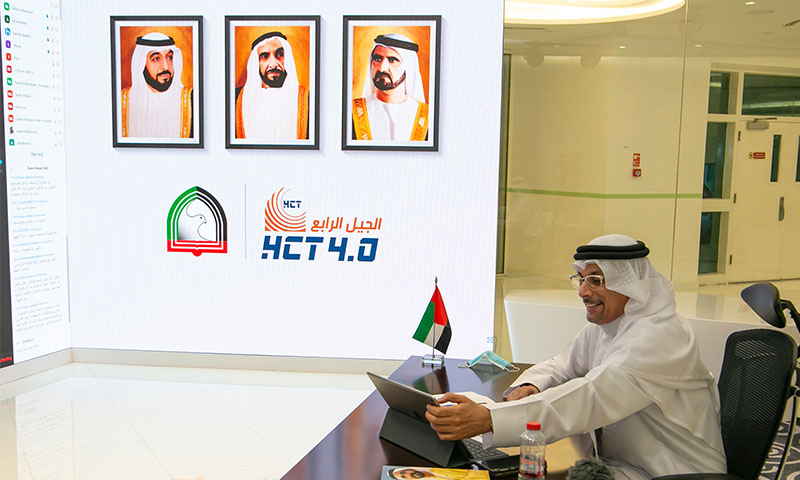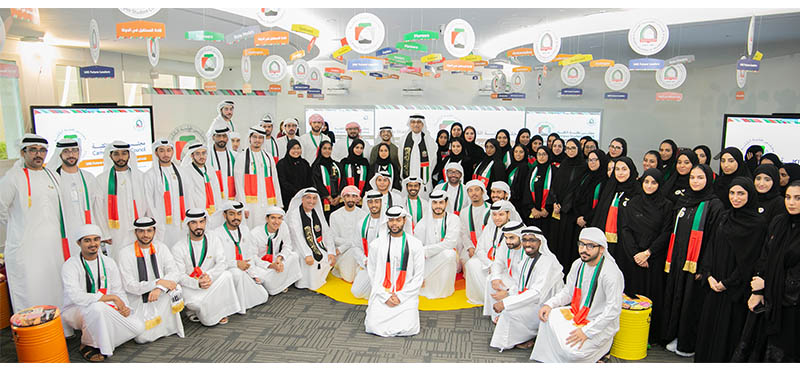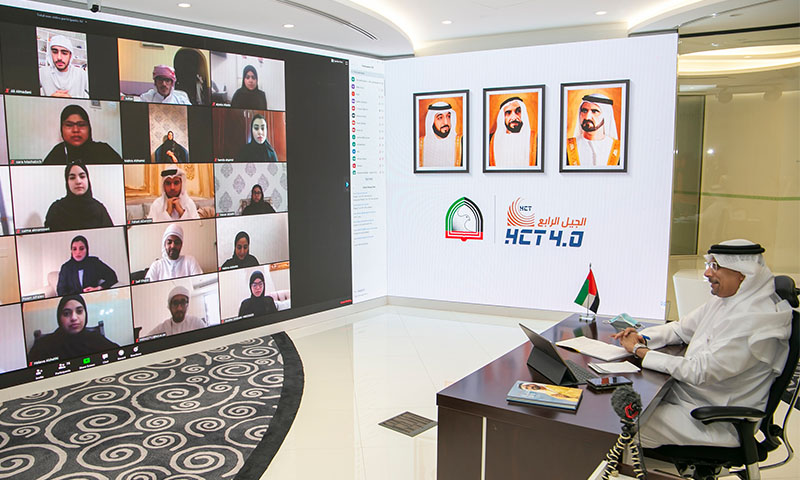Dr Abdullatif AlShamsi received his PhD from Duke University, the USA in 1997 and received his Master and Bachelor degrees from Boston University. He is the President & CEO for the Higher Colleges of Technology as per Federal Decree (29) for 2015. Before his appointment in HCT, he was the Managing Director of the Institute of Applied Technology (IAT) from 2007 till the end of 2014, where he established Applied Technology High Schools (ATHS), Fatima College for Health Sciences, and Abu Dhabi Polytechnic. Started his career at UAE University as an associate professor, Dr AlShamsi’s appointments at UAE University included the post of Assistant Vice Chancellor for Research where he founded a University-wide Internship and Work Integrated Learning (iWIL) program.
The Fourth Industrial Revolution continues to fundamentally change the way we live, learn, and interact with each other. Driven by technological advancement, this exciting chapter in our history presents both challenges and opportunities, and educators are obliged to ensure the next generation is prepared and equipped to embrace them. These extraordinary circumstances we currently find ourselves in demonstrate that the future can become the present in a blink of an eye. Addressing such challenges requires organizational agility, preemptive strategies, and continuous innovation.
Talent development is a crucial component of education, making it imperative for educators to prepare students for their chosen careers. Technological breakthroughs, coupled with a global crisis like the COVID-19 outbreak, have had a significant disruptive impact on several economic sectors, some are collapsing, and others are flourishing or emerging. This disruption is impacting the types of jobs available and, in turn, forcing educational institutions to reconsider which talents they should nurture and develop.

Witnessing these emerging developments and challenges, we arrive at a new school of thought in talent development that I call ‘Persona 4.0’. This refers to the qualities and attributes that I believe will be perceived as valuable traits in the future. This ‘Persona 4.0’ is like a three-dimensional model of the ideal target persona that education providers ought to nurture and groom. Persona 4.0 shall ensure graduates readiness not only for jobs that do not yet exist but also for unexpected challenges, such as COVID19 outbreak. The three dimensions are: ‘Digital Persona’, ‘Professional Persona’, and ‘Entrepreneurial Persona’, all of which should be developed alongside each other to craft the target persona of the future.
The ‘Digital Persona’ reflects the importance of empowering individual learners with the right tools to bring out their natural disposition to embracing technology. The ‘Professional Persona’ gives individuals the ability to lean in a continuous fashion embracing lifelong learning. Finally, the ‘Entrepreneurial Persona’ equips individuals to put their digital and professional personas in practice coupled with research and analysis to come up with creative ideas and ultimately turn them into innovative startups, a true contribution to the knowledge economy and societal wellbeing. The remaining of this article further explores each of these persona dimensions.
Starting with the Professional Persona, the ability to become professional learners throughout their entire life and beyond just their work-life or specific careers. A professional learner persona that can navigate rough waters and overcome challenges as and when they come. These are the individuals who reach an advanced level of knowledge through a process of learning that is unapologetically self-reliant. Looking back, we see a clear evolution in educational themes, from instructional learning (where the educator plays the central role) to interactive learning (where it is shared with the learner), to knowledge building and empowerment in their latest incarnation. The latter produces professional learners with creative mindsets capable of critical thinking and problem-solving in a progressive manner fueled by their passion for learning.

While education remained unchanged for extended periods in the past, today’s landscape is completely different due to the rapidly accelerating technological breakthroughs we witness daily. Today’s generation of learners is vastly removed from their predecessors, benefitting from advanced skillsets shaped by a combination of all previous educational methodologies. This is evident from their swift and seamless transition to online learning during the COVID-19 outbreak. They succeeded in keeping pace with the current transformation because technology is their language and passion. This is a generation naturally inclined towards professional learning, and this has never been clearer.
Today’s digitally-native students have seamlessly transitioned to distance learning. The next step is to empower them to assess their capabilities and set personal goals, an essential step towards instilling a habit of lifelong learning. Education should not be restricted to static academic plans, and universities are no longer the sole source of knowledge. Professional learners can benefit from a wide range of learning activities that they are exposed to daily. To the professional learner, a degree is just one part of a lifelong journey and not a goal in and of itself. It is a tool used to build knowledge and advance their careers.
The second dimension of the ‘Person 4.0’ is the ‘Digital Persona’, where the key to the successful transition of most education providers to online learning lies within the intrinsic digital abilities of students, their level of acceptance of digital tools and platforms, and their abilities to deal with them. Some of these abilities can be gained through study, but most are a byproduct of their daily lives, including their research, curiosity, and interests. This ‘Digital Persona’, built through embracing these digital tools, empowers them with required skill sets to be globally competitive and educationally self-reliant. Reinforcing this persona’s traits will create a generation that is prepared to face future career challenges. As educators, it is our responsibility to prepare students for the future and help them to gain the skills they need to improve their wellbeing.

Instilling the ‘Digital Persona’ identity early on supports the development of the ‘Professional Persona’ in a way that helps them utilize digital tools to develop their skills and careers continuously. To avail this, education providers should strategize educational technologies embedding it throughout the student journey. Applications of Artificial Intelligence, Big Data, and smart technologies have contributed significantly to students’ wellbeing and academic progression. Educational technologies investments have become inevitable for those education providers seeking to create a brighter and more prosperous future for us all.
The third dimension of the ‘Persona 4.0’ is the ‘Entrepreneurial Persona’, the risk-taking creative-minded persona. Startups and SMEs contribute massively to the GDP of advanced economies. They directly contribute to the job market by providing strong demand for young and highly qualified professionals. They increase economic activity, generating demand for product and services, which result in job creation in multiple sectors, providing a viable alternative to current job market offerings. In the knowledge-based society, education providers are increasingly challenged to become more socially and economically relevant organizations by contributing to socio-economic development through the generation and exploitation of knowledge converted into entrepreneurial opportunities.
The role of education providers is widening, moving beyond preparing graduates for employment to graduating companies and creating jobs. Educators need to nurture the ‘Entrepreneurial Persona’ in students by instilling in them entrepreneurial skills that allow them to innovate and create their opportunities. As evident by the emergence of entirely new industries since the beginning of the COVID-19 outbreak, today’s generation has the skill to put forward innovative ideas. Capturing these ideas and transforming them into successful business concepts is crucial to preparing our young people for jobs that did not exist before, yet the future demands them. Moreover, we need to empower them to navigate challenges not yet created.
The ‘Persona 4.0’ concept is an expansive vision that can be developed in line with future advancements and challenges. It is an educational paradigm shift that understands how today’s generation is different from previous ones, with unique abilities and inclinations, and produces professionals that can meet the evolving requirements of pressing societal and economic needs.
More About Dr Abdullatif AlShamsi

Dr AlShamsi has more than thirty-five research publications in world-class scientific journals and international conferences. His latest publications are a series of books published in Arabic titled: The Make of Education. Dr AlShamsi is a winner of the Federal Personality Award in its fifth edition, which is granted by HH Sheikh Mohammed Bin Zayed Al Nahyan, Deputy Supreme Commander of the UAE Armed Forces, and Chairman of the Emirates Center for Strategic Studies and Research (ECSSR).
Dr AlShamsi is currently the Vice Chairman of the Board of Trustees of the Institute of Applied Technology (IAT), and also of the Abu Dhabi Maritime Academy (ADMA). He is the Vice-Chairman of the Board of Trustees of the Emirates College for Advanced Education (ECAE), as well as Board member of the Board of Directors of the Emirates Schools Establishment. These are in addition to his membership of several higher committees and educational advisory councils, such as the Higher Education Coordination Council, and the Higher Committee for Aqdar World Summit.




